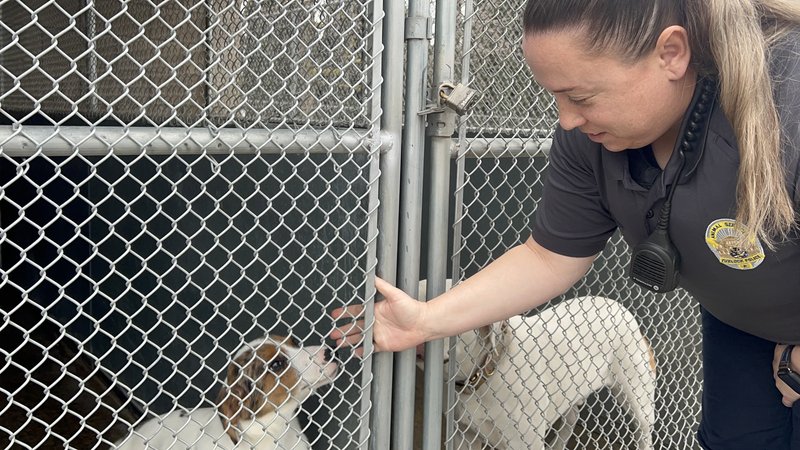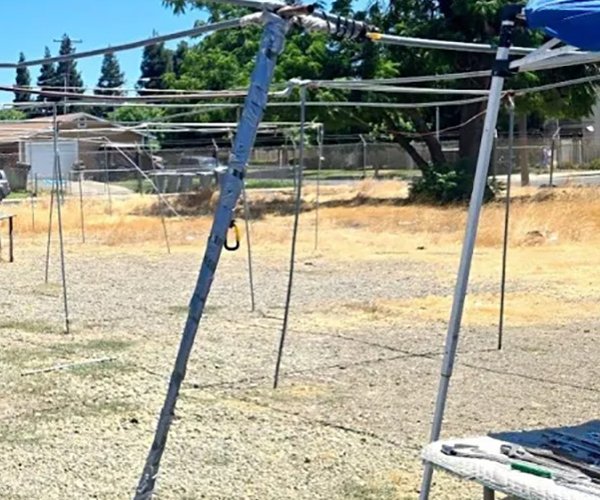A former volunteer for the City of Turlock Animal Shelter has come forward with allegations of mismanagement and animal cruelty during two separate appearances before the city council.
Karen Scheller, who volunteered at the shelter for about nine months in 2023, spoke during the public-comment portion of the Dec. 12 council meeting. She alleged that not enough effort was put into social media outreach, that weekend dog-adoption events were lacking, and that interaction with outside dog-rescue agencies was insufficient.
However, the most alarming claim was that one sheltered animal — a dog named Kirkland — was euthanized to spite her and drive her away from volunteer service.
That allegation was categorically denied by Police Chief Jason Hedden, Capt. Steve Rodrigues, Lt. Dave Shaw, who oversees the shelter, and Animal Control supervisor Katie Walthrop.
“I think we did support Karen the best we could,” said Shaw. “I think her passion drives her, and that’s awesome. But there are certain things as a municipality that we can’t do.

“We gave her a lot of latitude and we would always tell her how well she was doing. She did have some success, and I would argue great success. But a lot of the issues she brought up came after the Rescue Coordinator position was given to somebody else.”
Scheller, who met with Shaw and Walthrop to discuss her concerns, applied for the city’s 20-hour per week Rescue Coordinator position, one that ultimately went to Jamie Faria.
Scheller said she’s aware of the “disgruntled employee” perception.
“I will readily admit this to you, and you can put it on the record, because it’s the truth. The way they dismissed me really ticked me off,” said Scheller. “So, yeah, I kinda picked up my ax to call them out on what they could be doing better. They are killing dogs when they don’t need to die. Am I angry? Yeah, but not for reasons cited.”
Scheller was back before the city council on Jan. 23 with claims that two more dogs — Bud and Joker — were destroyed by the shelter when they had viable rescue options.
“These dogs had rescues lined up for them,” said Scheller. “Both dogs had dozens of people working around the clock to get them into rescue.”
Scheller said she contacted Pleasanton-based Lucky Dog Rescue about the animals on Jan. 3. Three days later, according to Scheller, Lucky Dog staff contacted Faria requesting dog-to-dog video and temperament notes on Joker, but did not receive the requested material.
Three days later, both dogs were euthanized.
Walthrop said she realizes that when it comes to animals, passions tend to run hot. She also pointed out that her job requires painful decisions be made.
“Trust me, there have been times when we’re in tears out here because we’ve formed a bond with an animal,” said Walthrop, who has five pets of her own. “But having to euthanize an animal is a blessing and a curse. It’s a blessing because we can end that animal’s pain and suffering. When they’re here so long, they start exhibiting behaviors that they normally wouldn’t exhibit. I’d rather let them cross to the other side here rather than getting hit by a car or starving in the street.”
Bud was a repeat offender, having been in the shelter on multiple occasions.
“We did network him to several hound rescues,” said Walthrop, who said the shelter puts down four to eight animals per month. “He got adopted this last time, but was returned because he was a fence jumper. The guy who adopted him said he was more than he could handle.
“With Joker, he had gone to events and was being networked to several rescues. We had one rescue — Lucky Dog — that was interested, but the dog was never tagged.”
When an animal is tagged by a rescue service, it’s basically like calling “dibs,” letting Walthrop and her staff know that there is interest, and efforts to transfer the animal to the rescue agency’s care should begin.
With just 32 kennels at the shelter, space is limited and tough questions must be asked: How long has the animal been in the shelter? Is the animal healthy? What is the age of the animal? Is the animal family-friendly?
With new animals coming in all the time, these are the factors weighed by Walthrop when deciding an animal’s fate.
“We had two puppies here — they were like 4 or 5 months old — and we walked them in to be euthanized and I looked at them and I was like, ‘No, take them back. Today is not their day.’”
And then there are dogs like King, a pit-bull that’s began showing signs of barrier frustration while losing weight and becoming aggressive.
“A lot of people won’t adopt a dog like that because he looks scary,” said Walthrop. “Some homeowners insurance won’t accept the breed, some apartments won’t accept it, and then some rescues won’t take him either, because he’ll potentially hurt another dog.”
During Scheller’s meeting with Shaw and Walthrop, both sides agreed that they didn’t want any bad blood to exist between the parties.
“I just want to help the shelter do better,” said Scheller. “Now I’m the bad guy because I’m going to city council meetings and I’m requesting public records and I’m meeting with the chief of police and I’m talking to a reporter. I just want them to do better. I know that they can.”








